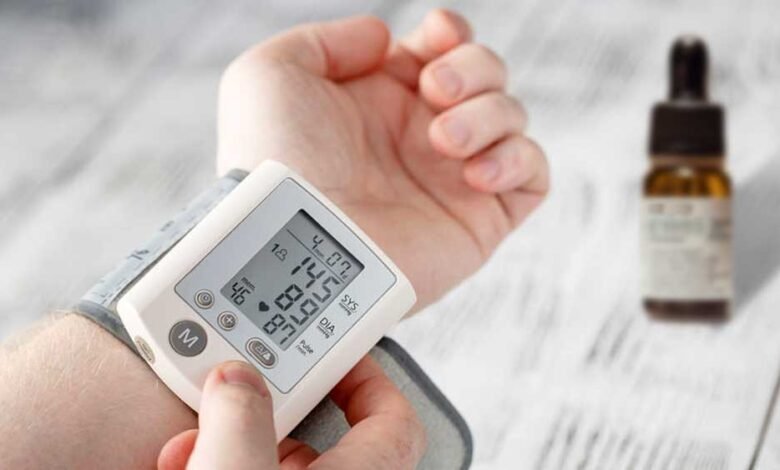Is CBD Effective in Lowering Blood Pressure?

When it comes to the use of CBD, many individuals credit it with everything good that has ever happened in their lives. Based on anecdotal evidence, you might believe that CBD makes you beautiful and wealthy, and that it transforms your bodily fluids into pure gold.
When people are enthused about something’s potential, they have a tendency to overhype it, and this is especially true in the case of CBD.
Studies on CBD are still in their early phases, but a large amount of evidence suggests that people aren’t far off the mark when they claim that CBD makes them feel happier or less worried, as reported by many people. CBD’s potential for medicinal applications, such as blood pressure regulation, is yet in the very early stages of investigation.
It’s important to understand the background of the claims made about CBD and how individuals came to these findings before beginning to use CBD to treat high blood pressure or before dismissing CBD as a treatment for high blood pressure out of worry that it will decrease your blood pressure too much. It is possible that CBD will have an effect on your blood pressure, but it is unlikely to function in the way you believe it will.
Read More: Does Cannabidiol (CBD) Affect Your Driving Ability?
The FDA’s consensus on CBD vs. public uses for CBD
The FDA has only approved CBD for the treatment of some severe seizure disorders, and this is the only indication for which it has been approved. They have not approved CBD for any other use, including the treatment or cure of other diseases like as hypertension. The fact that people have tried CBD and experienced certain results is important to keep in mind when reading the opinions of those who have tried CBD and experienced certain results.
It does not necessarily imply that they are not telling the truth. It simply means that, for the time being, the majority of doctors will recognize and recommend FDA-approved drugs rather than CBD for the treatment of your health concerns.
It is still recommended that you consult with your doctor before beginning to use CBD, even if your well-educated and sophisticated friend has the best of intentions when recommending it to you. If you have a significant physical illness or a mental health concern, seeking proven therapy should be your first and foremost consideration.
Using CBD in conjunction with a well-researched and licensed medication may be able to provide natural relief, but it should never be used as a substitute for medical treatment.
The huge difference between CBD and THC
CBD and THC are both found in cannabis, albeit in various levels, and have different effects on the body. The majority of marijuana contains significantly more THC than CBD, and marijuana that contains significantly more CBD is commonly referred to as hemp.
Because CBD and THC interact with the body in distinct ways, they will not have the same effects when consumed in conjunction with one another. THC has its own set of risks and potential benefits that are distinct from those associated with CBD.
If you intend to consume CBD, it is preferable to do it in the form of hemp rather than regular cannabis, according to the American Hemp Association. You’ll get to enjoy more of what CBD has to offer while minimizing the risks and side effects that come with THC use, which is ideal.
CBD and heart health
According to some study, THC, particularly when smoked, has the potential to impair the cardiovascular system. Smoking has the potential to be harmful to your heart and lungs, regardless of what you are smoking.
Despite the fact that CBD can be smoked, most individuals prefer to consume it in the form of pills or sublingual tinctures, which they utilize as wellness items.
Non-inhaled CBD forms are the most commonly studied for their effects on the heart because they are easier to administer. This means that your hemp cigarette will not have the same benefits as CBD edibles or CBD taken sublingually, which are also available options.
A study on CBD in mice discovered that when CBD is used alone, it may have cardioprotective effetcs. According to the findings of the study, CBD may have the capacity to reduce harmful cardiac consequences associated with diabetes. These same effects may also be beneficial to people who are suffering from other types of cardiovascular disease. The keyword here is “could.”
This isn’t something that has been studied in depth in humans, and people have a tendency to use CBD in a way that is very different from what has been observed in mice. Unlike humans, mice do not self-administer, and they are frequently given much higher quantities of cannabis than would be used in human trials, all of which takes place in a highly controlled environment. We need more human studies before we can draw definitive conclusions about what CBD can and cannot do to promote heart health. We also need more studies on animals. Keep in mind that while the mouse study was a significant first step in the right direction, it should not be taken at face value. There is still more work to be done.
The fact that cannabinoids are immunomodulators with the potential to reduce inflammation in humans has been established. Reducing inflammation has been shown to increase blood flow, which may be advantageous to the heart in some circumstances.
However, this does not imply that CBD is a cure for cardiac diseases; rather, it suggests that it may assist the body’s ability to recover and respond to medically approved treatments. Keep it in mind as you’re going over the facts with your colleagues.
Read More: Can CBD Help Treat Depression and Anxiety?
The effects of CBD on blood pressure
Carbon dioxide exposure has been shown to increase blood pressure. It is likely that smoking CBD would result in the inhalation of carbon monoxide, which would have a negative impact on the user. The capacity of CBD delivered orally to cause relaxation is being investigated, and when the body is relaxed, it is possible that the blood pressure may naturally fall.
This is only true if the heightened blood pressure was induced by an upset emotional state in the first place. As a result of becoming angry, anxious, or disturbed, your blood pressure may rise. However, if you generally have a healthy cardiovascular system and normal blood pressure, the best thing you can do is calm yourself down.
At the time, there are just a few trustworthy studies that directly demonstrate that CBD can lower resting blood pressure in healthy individuals. The word “few” is distinct from the word “none.”
The notion that CBD can lower blood pressure when it rises in reaction to an external source of stress is supported by a study conducted in the United Kingdom. The individuals in the study were in good health and did not have any disorders related to high blood pressure.
It is possible to alleviate emotional tension by removing yourself from a stressful situation and engaging in a calming activity, which will allow your body to return to a more relaxed condition. Some people believe that utilizing CBD as part of their relaxing ritual is beneficial to their health and well-being. If your doctor doesn’t think it’s an issue, there’s no reason why you shouldn’t do it, either.
What not to do
Don’t use cannabis in conjunction with blood pressure drugs unless you have a prescription.
The cannabinoids in marijuana have the potential to cause harmful interactions with a wide range of drugs, including those used to treat high blood pressure. Cannabinoids should not be taken with blood pressure medications or blood thinners if you are already taking either of these medications. It makes no difference whether you smoke them, vape them, or consume them. They’re both entering your body in the same manner.
In order to effectively manage chronic high blood pressure, you must work closely with your doctor to ensure that your condition is well controlled. This is not something that can be treated at home in the same way that a typical headache, upset stomach, or skinned knee can. You should not attempt to replace or customize your treatment plan without first consulting with your doctor or other healthcare professional.
You won’t know whether or not your doctor approves of your CBD use until you have that chat with him or her. Don’t try anything unless you’ve been asked. When it comes to cannabinoid edibles, even if they include THC, your doctor may determine that you would benefit from them in certain conditions. Before you introduce anything new into your routine, be sure you have all of the necessary information.
Read More: What Is the Most Effective Way to Take CBD?
CBD for people with normal blood pressure
In persons who already have normal blood pressure, CBD taken orally appears to have no deleterious effect on the level of that pressure.
It is not necessary to be concerned about harmful medication interactions if you are not currently using any prescription medications and wish to incorporate CBD into your regular wellness practice.
Adverse events and side effects are possible with CBD use, however they are most often caused by ingesting too much carrier oil, which is rare. The CBD compound itself is generally well tolerated by the majority of people.
Final Thoughts
CBD has been shown to lower blood pressure in certain people, however it cannot be used to treat high blood pressure disorders directly. If your heart races when you’re upset or anxious, there is some evidence to suggest that CBD may be able to assist you relax and relax more. The situation is quite different if you are experiencing health problems as a result of your elevated blood pressure. Follow the instructions provided by your doctor.
Emjay offers a wide range of CBD-infused wellness products for people who want to get the benefits of CBD without risking their health. You can place an order and shift into something comfortable if you’re seeking to unwind a little. You may expect us to arrive in approximately half an hour to hand over the CBD to you.







